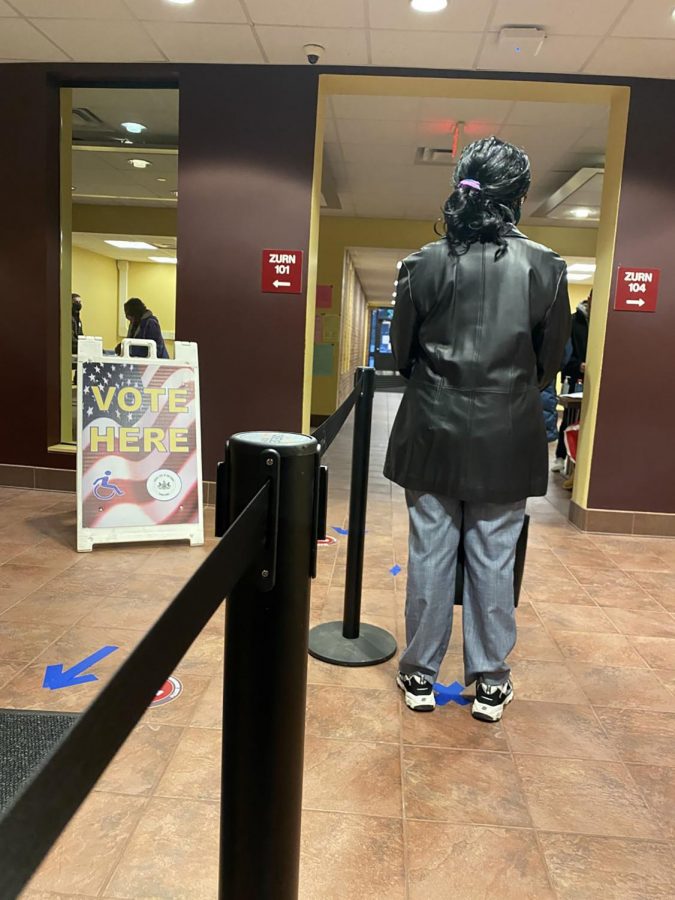Student body reflects on divisive election
November 10, 2020
In most cases, the U.S. presidential election is decided on election night, yet in 2020, that did not occur.
From Tuesday night until Saturday morning, several states — Alaska, Arizona, Georgia, Pennsylvania, Nevada and North Carolina – remained too close to call.
However, the Associated Press declared Saturday morning that former Vice President Joe Biden had won Pennsylvania, thus putting him over the 270-threshold needed to become the 46th president of the United States.
The contentious battle between President Donald Trump and Biden had been extended as mail-in ballots continued to be counted in these critical battleground states.
In light of the outcome, the Trump campaign has filed lawsuits in Pennsylvania, Georgia, Michigan, Arizona and Nevada for a variety of reasons.
The Trump campaign has filed a lawsuit in Pennsylvania due to allegations that observers were not allowed to watch the vote count in Philadelphia County, a bastion of Democratic votes. A Pennsylvania judge granted the Trump campaign’s request to observe poll workers in the Philadelphia area process what’s left of the mail-in ballots. However, the campaign’s request to halt the Philadelphia vote count was not granted.
The Trump campaign has also attempted to stop vote counting in Michigan, asking the state court to halt the counting until courts can properly enforce rules that allow for campaign observers to view ballots being opened and counted. This stems from the campaign alleging that poll watchers were being denied access to observe vote counting at polling sites in Detroit.
In the end, a judge said Thursday the plea would be denied since counting there is nearly completed.
In Arizona, the Trump campaign is fixated on the issue of sharpies being used on ballots in Maricopa County and in other areas of the state.
The judicial action on this is pending.
The Trump campaign has also attempted to garner a recount in Wisconsin and will be getting one in Georgia under Georgia recount laws.
As of the time this article was written, Biden leads Trump in both the popular vote 74,816,025 to 70,556,016 and the Electoral College 279-214, according to the Associated Press.
The fight has also spilled onto social media, as factions of vocal users have claimed that rampant voter fraud has occurred in key battleground states, fueled in part by Trump’s claims that the election is being stolen from him.
At the time this article was written, the president has refused to concede the election, despite Biden being declared the winner by major news networks.
The chaos of the election fallout emitted strong emotions among students.
Nathan Manion, a junior political science major, said election night was nerve-racking; however, he said he felt better as the week went on.
“I felt more confident in a Biden win,” Manion said.
“Now that Biden has won, I am excited to see normalcy, honor and respect brought back to the White House.”
Manion said he believes that now is the time to heal, and Biden is the one who will bring about that process.
“While Joe Biden might not be who you voted for, we should still allow him the opportunity to lead this country,” Manion said.
However, Manion said that he is worried Trump will not concede, further inflaming division.
“Democracy is what makes this country great,” Manion said. “Trump being someone who wanted to keep America great still has the opportunity to do that, upholding our democracy.”
Similarly, Josh Staley, a junior political science major, said he was nervous on election night, but is happy with the outcome.
“Once the election was over, I was able to take a huge sigh of relief,” Staley said.
“The last four years have brought a lot of fear and anxiety for millions of Americans; now they can see a president who respects and appreciates them.”
Staley said the excitement over the outcome was evident in the aftermath.
“I think you could see that in the way people celebrated all over the country,” Staley said.
Despite the divide, Staley said he is optimistic for the future of the country.
“I truly believe that President-elect Biden can unite our country and make real important change in our country,” Staley said. “I’m excited to continue the fight.”
Students like David Thompson, a junior criminal justice major who supported Trump, felt more optimistic on election night.
“Election night felt kind of crazy,” Thompson said.
“People thought Trump was going to win handily but they weren’t taking into account the millions of mail-in ballots.”
Despite his candidate not winning, Thompson said that it’s time to come together and unite.
“I feel like it’s time to heal the divide that has developed over the last four years,” Thompson said.
“We need to come together more because this hard divide between the right and the left is going to drive this country into the ground.”
Taylor Keller, a junior nursing major, said she was nervous on election night and was not a fan of the outcome.
“Honestly, I was angry because of how there were votes coming up mysteriously from only the Democratic side,” Keller said.
Most of the mail-in ballots favored Democratic candidates since Democrats seemed to vote by mail due to COVID-19, while President Trump encouraged Republicans to vote in person.
Keller said she does not believe that Trump will let this go and that Biden will be bad for the United States.
“I do not feel safe under his control,” Keller said. “I foresee us going into a third-world country and having our rights taken away as citizens.”
Despite her strong feelings on the outcome, Keller said that it was time to research what the two parties truly stand for and to start focusing on love and not hate.
“I have lost friends from my point of view,” Keller said. “I think both views need to be respected because everyone is different and that’s OK.”
Although Republicans seemed to have a stronghold in the Senate election, the results will now be determined by Senate runoff elections in Georgia in January.
Democrats will maintain their majority in the U.S. House of Representatives albeit with little momentum; Republicans picked up a net six seats at the time this article was written, while Democrats had only managed to flip two Republican-held seats.
It may still take a while before all House races are called.
In Pennsylvania, most races have been called.
Attorney General Josh Shapiro won a second term over challenger Heather Heidelbaugh, while Treasurer Joe Torsella lost his reelection bid to Republican Stacy Garrity.
History was made in the auditor general’s race, as Republican Timothy DeFoor became the first Republican to win the office since 1992 and also became the first person of color to win a statewide office in Pennsylvania’s history.
In total, Republicans surprisingly won two out of the three statewide row offices in Pennsylvania, something that has not been accomplished in close to 30 years.
The Pennsylvania congressional delegation will remain the exact same heading into the 117th Congress, with incumbent Reps. Brian Fitzpatrick (R-1), Scott Perry (R-10), Matt Cartwright (D-8) and Conor Lamb (D-17) holding on in hotly contested races.
In Pennsylvania’s 16th Congressional District, which encompasses the city of Erie, incumbent Rep. Mike Kelly (R-16) won reelection over Democratic challenger Kristy Gnibus with nearly 60% of the vote.
In other local elections, state Sen. Dan Laughlin (R-49) won a second four-year term by defeating Democratic challenger Julie Slomski.
Meanwhile, the Erie delegation in the state House will stay intact for another two years with incumbent Reps. Pat Harkins (D-1), Bob Merski (D-2) and Ryan Bizzaro (D-3) all winning their races.
Both Harkins and Merski were unopposed in their bids, while Bizzaro defeated Republican Greg Hayes.
MICHAEL GUIDO






